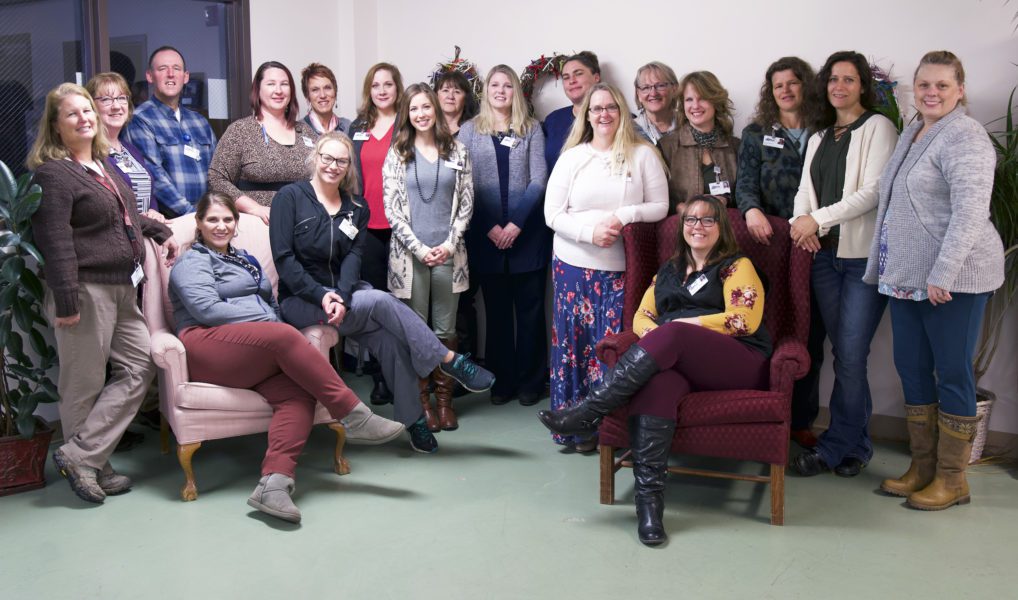NURSES
Trained hospice nurses make regularly scheduled visits and are on call 24 hours a day, seven days a week. They act as a liaison with the patient’s primary care provider enabling quick response to changes in medication or symptom management. Pain control and symptom management are the focus of the physical aspect of hospice care. Hospice nurses are also teachers and train the caregiver how to enhance the care of their loved one. Concentrating on living fully is easier when the patient is free of pain and comfortable.
HOME HEALTH AIDES
Home Health Aides visit regularly, if needed, to help patients bathe and dress. The aides provide compassionate care that helps the patient live with dignity.
THERAPISTS
Physical therapists, occupational therapists, and speech therapists can assist the patients, as needed, to help them keep as safe and as comfortable as possible. These therapies can enhance the quality of life for our patients.
SOCIAL SERVICES
Pain at end-of- life is not only physical but emotional and can occur when facing death and impermanency. Care is provided by degreed individuals such as social workers and Licensed Clinical Social Workers. Services are individualized, based on what the patient and their loved one’s desire. It may be anticipatory grief counseling, accessing resources, navigating financial challenges, talking with children about what is happening, conducting family meetings to address conflicting agendas and clarify patient goals, bereavement support, or exploring with the patient their fears and finding meaning within transitioning into end-of-life. Social workers support and focus on what matters most to you. For additional information, call our office at 406-535-6302 and ask to speak with Julia Valach, MSW, LCSW.
CHAPLAINS
Non-denominational hospice chaplains offer spiritual support if the patient wishes. Following the hospice philosophy of treating the whole patient, we at CMMC Hospice address the physical, emotional, and spiritual wellbeing of our patients. Hospice chaplains strive to bring comfort, healing, peace and compassion to all they serve. Chaplains can be a liaison with the patient’s own spiritual caregiver or clergy. Chaplains can also visit regularly to offer spiritual care and counsel. Chaplains listen, read stories, hold hands, and offer prayer. Chaplains can offer funeral and memorial assistance.
VOLUNTEERS
Trained hospice volunteers assist patients and their families. Volunteers visit with patients, provide companionship, and allow the caregiver to have a break. Volunteers listen, read, take walks, or just sit quietly as a compassionate friend. Office and Bereavement Volunteers also assist patients and families, often by working behind the scenes. Learn more about volunteering with Hospice, please click here to visit the volunteer page.
MEDICAL EQUIPMENT AND SUPPLIES
Hospice can provide a variety of durable medical equipment including beds, walkers, commodes, or wheel chairs as needed.
ELIGIBILITY FOR HOSPICE CARE
Any person facing the advancing stages of any terminal illness is eligible for hospice care. Hospice care is appropriate when:
- The physician thinks the patient will live six months or less.
- The patient, family, and physician agree and understand that the focus is on comfort (pain control and symptom management), not cure.
WHO PAYS FOR HOSPICE BENEFITS?
Hospice services are based on the patient’s health care needs, not their ability to pay. Reimbursement for services is available through Medicare, Medicaid and other insurance plans. Options for subsidized care are available for income-qualified patients. Our goal at CMMC Hospice is to provide hospice care to all seeking our services, regardless of their ability to pay. Donations from the community uphold this goal.
CONTACT US
For more information or to enroll, call CMMC Hospice at 406-535-6302.


